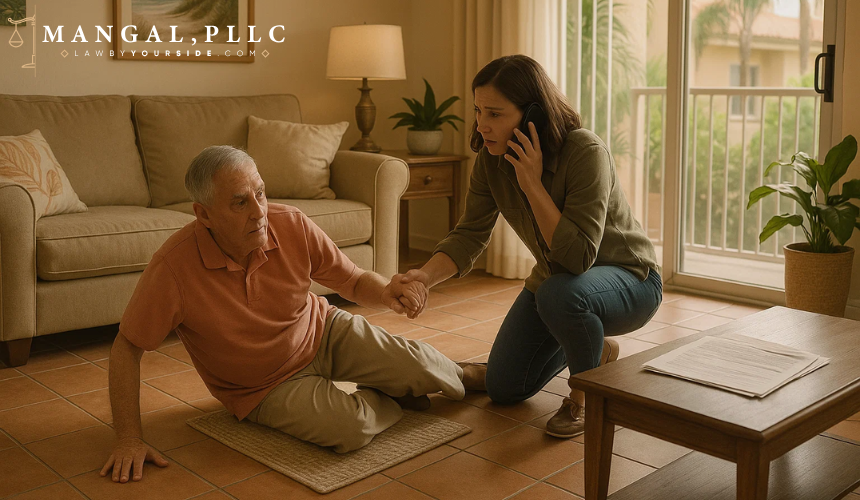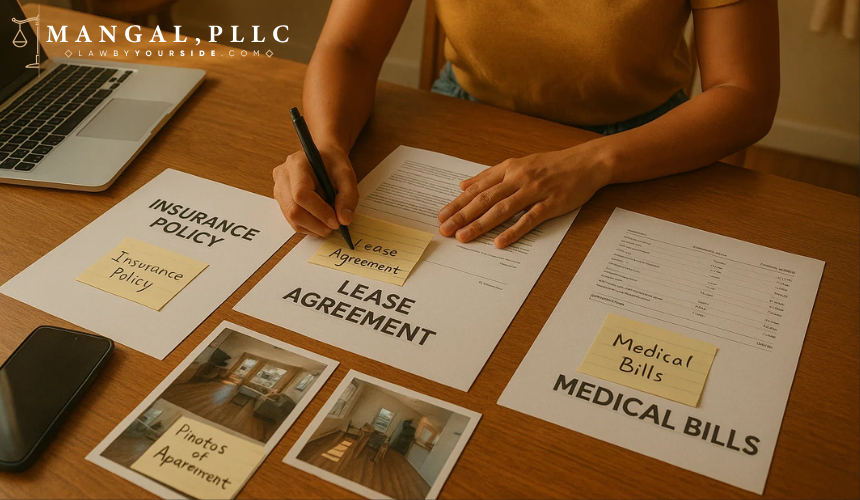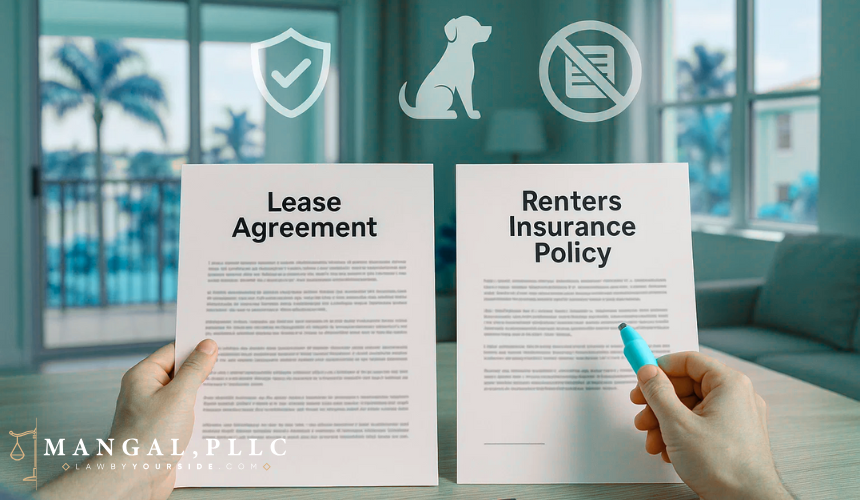If you rent a place in Florida, you’ve probably been told at some point that you “should get renters insurance—it protects you if something happens.” Most people nod and move on without really thinking about what that means. Then somebody slips on your hallway rug or your dog nips a delivery guy, and suddenly you find yourself scrolling through your insurance policy trying to find out words like “personal liability,” “medical payments,” and “personal injury.” It’s not as straightforward as it sounds.
Renters insurance in Florida does protect you in a lot of situations, but not in the blanket way many renters assume. And the biggest misunderstanding usually circles around the phrase “personal injury.” To most people, that means: physical harm, broken bones, bruises, or maybe a hospital bill. But in the insurance world, it means something else entirely. If you don’t know that difference ahead of time, you might think you’re covered when you’re not.
Understanding what your policy actually includes can help you avoid denied claims and surprises. And if you’re already dealing with an injury claim or an insurance dispute, MANGAL, PLLC help renters in Central Florida make sense of their rights and fight back when insurance companies don’t.
So What Does Renters Insurance Really Cover When Someone Gets Hurt?
Let’s break it down without sounding like a policy manual.
A standard renters insurance policy in Florida, called an HO-4 policy, includes two main protections that apply when someone gets injured:
- Personal liability coverage
- Medical payments to others (also called guest medical coverage)
These two pieces sound similar, but they’re meant for completely different situations.

Personal liability is what steps in if someone gets hurt and you could be blamed for it. Maybe you left water on the kitchen floor and a friend slipped. Maybe someone trips on a broken tile you never fixed. Or your kid accidentally throws a baseball through the neighbor’s glass door. Liability insurance covers injuries and property damage you’re legally responsible for. It also pays for lawyers if that friend decides to sue you because their medical bill turned into something huge.
Most policies start at $100,000 in liability coverage, but to be honest, that amount can disappear fast if a lawsuit is involved. That’s why a lot of renters bump it up to $300,000 or even $500,000 especially if they have pets, host people often, or just don’t want to risk losing everything over a single accident.
The second protection guest medical payments is more like a goodwill gesture built into your policy. It pays for small medical expenses if someone is hurt at your place, even if it wasn’t your fault. No arguments about who’s to blame. It just covers the bill and moves on. We’re talking about things like urgent care visits, X-rays, stitches usually $1,000 to $5,000 worth.
And no, this doesn’t cover you or anyone you live with. It’s strictly for guests.
Then What Does “Personal Injury” Actually Mean?
Here’s where things get messy. In normal life, if you said, “She has a personal injury claim,” people would assume you mean she got physically hurt. But to insurance companies, “personal injury” doesn’t mean bodily harm. It means a completely different category: reputational or emotional harm.
Insurance companies define personal injury as things like:
- Libel or slander (publishing or speaking false statements that harm someone’s reputation)
- Invasion of privacy
- False arrest, wrongful detention, or wrongful eviction
None of that involves a broken leg or a hospital bill. And here’s the important part—

Your renters insurance does not automatically cover this. You only get protection for personal injury claims if you add something called a personal injury endorsement to your policy.
So if you’re a renter who posts reviews online, uses social media actively, has roommates, or rents out a room through a sublease—this extra coverage is worth thinking about. The endorsement usually costs just a few dollars a month, but it protects you from lawsuits that could cost thousands.
What About Dog Bites? It’s Florida—Someone Has a Dog in Every Building
This is where Florida law hits hard.
Florida has a strict liability rule when it comes to dog bites. If your dog bites someone, you’re legally responsible—even if your dog has never bitten anyone before, and even if you thought your dog was “the friendly type.”
So naturally, renters assume, “No problem, my renters insurance will cover it.” Sometimes it does. Sometimes it absolutely does not.

Many Florida renters insurance policies include dog bite liability—but here’s the catch: insurers can exclude certain breeds or dogs with a bite history. And despite Florida’s 2023 law banning local governments from discriminating against dog breeds, insurance companies are still allowed to refuse coverage for breeds like:
- Pit Bulls
- Rottweilers
- Dobermans
- German Shepherds
- Huskies
So even if your county allows your dog, your insurance company might not cover it.
Before you sign your policy, it’s smart to ask your insurer directly:
- Does this policy cover dog bites?
- Are certain breeds excluded?
- Does the policy still apply if the bite happens outside my home?
- Do I need a separate pet liability policy?
If your dog isn’t covered under your renters insurance, you might need a pet liability policy or personal umbrella coverage to protect yourself.
What Renters Insurance Doesn’t Cover?
A lot of renters don’t find out what their policy doesn’t cover until a claim gets denied. By then, it’s too late to fix it. Florida renters insurance has exclusions—things the insurer simply won’t pay for under any circumstance.

Some of the most common exclusions include:
- Your own injuries or injuries to someone who lives with you. Renters insurance exists to protect guests and strangers, not household members.
- Intentional harm. If you purposely hurt someone or damage property, the insurer won’t help you.
- Business-related injuries. If you freelance, run a small salon from home, or sell products and a client is injured on your property, your personal renters policy may not help. You may need a business rider or a separate policy.
- Certain dog breeds or dogs with a bite history. If your policy excludes your pet, the insurer can legally refuse a dog bite claim.
- Short-term rentals like Airbnb. Most renters insurance policies do not cover accidents that happen during Airbnb hosting unless you add a special endorsement.
Another big reason insurers deny claims is misrepresentation—leaving out information when you signed up. If you didn’t mention you had a big dog, extra roommate, or ran a small home business, the company might cancel your policy or deny claims entirely.
Do You Need Extra Coverage Like an Umbrella Policy?
Maybe you’re wondering—if renters insurance covers liability, why would anyone buy extra protection?
Because liability claims can get expensive very quickly. A serious fall, a dog bite, or a lawsuit over a social media post can go way beyond $100,000. That’s where umbrella insurance steps in.

An umbrella policy:
- Extends your renters liability limits (usually adds $1 million or more).
- Covers some situations your renters insurance doesn’t.
- Protects your savings, wages, and assets if you’re sued.
It’s surprisingly affordable—many Florida renters pay between $150 to $300 per year for $1 million in umbrella coverage.
If you host guests often, own a dog, or just want extra peace of mind, umbrella coverage can be worth it.
How Much Coverage Should a Renter in Florida Carry?
There’s no law requiring renters insurance in Florida, but many landlords include it in their lease agreements. Still, the required minimum is usually low—maybe $100,000 liability coverage. The problem is, that might not be enough.

You should consider higher limits if:
- You own a dog
- You host parties or visitors regularly
- Your rental has stairs, a balcony, pool, or other hazards
- You wouldn’t be able to pay out of pocket if someone sued you
A smart setup for most renters in Florida looks like this:
- Liability coverage: $300,000 or $500,000
- Guest medical coverage: $3,000–$5,000
- Optional add-ons: Pet liability, personal injury endorsement, or umbrella policy
How to Avoid Claim Denials?
When something happens—someone gets hurt, a lawsuit is filed, or a dog bite occurs—the insurance company will want proof. If you have no documentation, it becomes your word against theirs.

What to keep:
- A copy of your renters insurance policy and lease agreement
- Photos or videos of your apartment before any accident happened
- Incident details: dates, times, names of people involved
- Medical reports or bills from the injured party
- Communication with your landlord (emails or messages about unsafe conditions)
- Pet vaccination and training certificates if you own a dog
This may seem like overkill—but when money is involved, insurers ask questions. Documentation answers them before your claim is questioned or denied.
Policy Language vs Lease Language
You rely on your renters insurance when something goes wrong. But your lease agreement (the contract with your landlord) matters too.

Certain lease terms might affect your coverage, like:
- Who maintains safety features — railings, stairs, smoke detectors
- Pet restrictions — if pets are banned but you hide one, insurance may deny pet-related claims
- Guest restrictions or party limits — accidents during a big party might lead to disputes if they violate the lease
- Requirement to list landlord as “additional insured” on your renters policy
If your lease says you can’t have a dog and your dog bites someone, both your landlord and insurance company could refuse responsibility.
To stay safe, make sure your lease, your actual living situation, and your renters insurance all match.
When Renters Insurance Helps — And When It Doesn’t?

1. Slip-and-Fall in a Tampa Apartment
Your friend slips on a wet bathroom floor, sprains an ankle, and needs X-rays. Medical payments coverage can pay their bill. If they sue for negligence, your personal liability coverage takes over.
2. Online Drama in Orlando Turns Legal
You post a bad review about a roommate, they claim you ruined their reputation and file a lawsuit. Your renters policy only helps if you added the personal injury endorsement. Without it? You’re on your own.
3. Dog Bite in Miami
Your dog, never aggressive before, bites a food delivery driver. If your policy covers that breed, insurance pays medical bills and legal costs. If your policy excludes your dog? No coverage—lawsuit risk.
4. Fire Pit Incident in Jacksonville
You host a barbecue. A guest burns their hand on a fire pit. If outdoor fire pits are allowed by your lease and you weren’t careless, renters insurance should cover it. If your lease banned open flames? Claim denied.
Frequently Asked Questions
Does renters insurance cover guests who get hurt?
Yes. Either through liability or guest medical coverage.
Does it cover my own injuries?
No. Renters insurance is designed to protect other people, not you.
What does “personal injury” coverage actually include?
Defamation, false arrest, invasion of privacy—not physical injuries.
Are dog bites covered in Florida?
Only if the policy includes dog liability and your dog’s breed isn’t excluded.
Can insurance companies deny claims if I didn’t mention my pet or roommate?
Yes. Misrepresentation on your application can void your policy.
You Need Legal Help When Insurance Isn’t on Your Side
If your renters insurance claim has been denied, if you were injured at someone’s rental property, or if an insurance company is dragging its feet, you don’t have to deal with it alone.
The personal injury attorneys at MANGAL, PLLC work with renters throughout Clermont, Orlando, and Central Florida. They help clients understand their policies, challenge unfair denials, negotiate settlements, and when necessary—take legal action.
MANGAL, PLLC – Florida Personal Injury Law Firm has been voted the number one injury firm in Central Florida and is trusted by more than 1,000 clients, with five-star ratings across Google and Avvo.
You can schedule a free consultation, get your insurance documents reviewed, and understand your rights before making a decision that could affect your finances and future.



